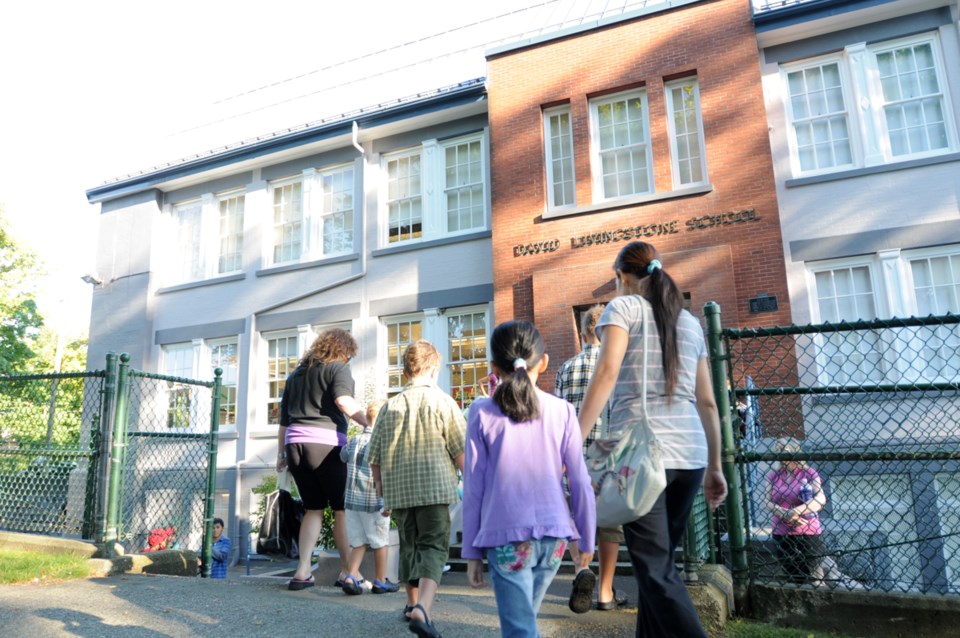The B.C. NDP government has made some significant changes since coming to power last year — they’ve introduced hefty new property taxes, changed the way our medical system is funded and tried to end money laundering in our casinos and big donations in our politics.
Will there be a similarly significant change to the way schools are funded once a review of education funding is complete?
It’s impossible to say, but a recent discussion paper asks some tough questions.
Should school funding be linked to student success? Should a change be considered in the way students with special needs are funded? Should the budget be based on headcount, courses, credits or some other way? How can the province make sure students across the province get equal educational opportunities?
Answers will have to wait until late this summer, when a final report with recommendations is expected. Hints, however, about the direction the review is taking can be found within the discussion paper, which includes survey responses from 350 people.
Clearly, the government is considering somehow linking funding to student success, given what’s in the discussion paper, which says “B.C.’s funding model is becoming outdated relative to other provinces.”
Parents can also expect changes to how students with special needs are funded. This may be a move to a funding model that predicts how many students with special needs and vulnerabilities are expected and then funds accordingly, rather than relying on individual diagnoses of special needs.
Graduation rates are much lower for students with special needs, Indigenous students and children in care, which shows undeniably that something needs to change.
But what’s not clear is whether a more predictive and less diagnostic funding model will make things better for students with special needs. The report argues that money currently spent on counting, assessing and administering services for students with special needs could be redirected to actually educating them.
Several school districts say they spend between 15 and 20 per cent of their overall budget for special needs students on administration, assessments, paperwork and reporting, resulting in about $100 million a year that could be redirected, the paper says.
A vast majority of survey respondents — 77 per cent — said some students who require services and supports are not getting them.
“Education is a basic right for all students — not just typical students but those with complex learning needs as well,” one survey respondent wrote. “I believe that if competencies are important to society, we need to shift our culture to that of complete inclusiveness… and that means meeting the needs of all students — not just the majority.”
Expect something in the final report to address inequities among school districts. The discussion paper notes that about 89 per cent of school districts’ budgets is spent on salaries and benefits, which are dictated by collective agreements and therefore beyond the district’s control.
Across the province, there are 60 different collective agreements for teachers and 71 collective agreements for other school staff, the report says. Those agreements all contain different language about class size, class composition and the numbers of specialist teachers required.
It’s patently inequitable when some districts have firm rules, while others do not. Vancouver’s contract is among the richest in the province, but the funding formula review or next year’s teacher contract negotiations could change that. It’s a near-certain bet that the province will try to address the inequity one way or another. And, barring a massive hike to the education budget, this review will mean some districts get more while others get less.
Also probable: a change in how school districts balance their budgets. The discussion paper echoes concerns of the previous Liberal government that school districts tend to budget overly conservatively to avoid deficits, which means they end up with surpluses each year.
Although the surplus cash must be used for education in the long run, the system means the government puts out more cash sooner than is necessary. Last year, there was $300 million in accumulated surpluses across the province, the discussion paper says. The tone of the discussion paper suggests a change will be coming to cap those amounts.
The new funding model, which the government says will be responsive, equitable, stable, predictable, flexible, transparent and accountable, is expected to be in place by the 2019-20 school year.
Tracy Sherlock writes about education and social issues. She can be reached at tracy.sherlock@gmail.com.



